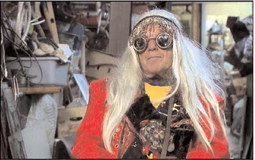The One and Only Prince Mongo

Eccentric Memphis personality has quite a history
A Times Special Feature I’m concerned, spirits. I use the affectionate but otherworldly address to end that statement because the person about whom I’m concerned is a Memphis icon who regularly posts on his Facebook page but hasn’t made any posts since late April. He was born Robert “Bob” Hodges, but that’s not the familiar moniker by which most Memphians and those in the Mid-South know him.
Bob, as he has been called by close friends and relatives, was graduated from the University of Virginia and Tulane Law School.
Prior to Vietnam, he served as a First Lieutenant in the Army Airborne. In the 1960s, he ran a men’s store on Memphis’ Union Avenue called Dalian et Rae, selling high-priced European-imported menswear. According to Larry Epstein, a current Memphis resident, he worked for Hodges at his exclusive store in 1967, when he was 21 years old.
Epstein describes himself as having been “a kid in a candy shop,” and says he was offered the opportunity to purchase an elegant silk and wool sport coat from Hodges at an affordable price on his $1.67 an hour salary.
Epstein describes Hodges as “eccentric,” saying that sometimes when he would attempt to organize a clothing displays rack to make it look more orderly or stack up a pile of shirts, Hodges would stop him, saying, “I like stuff messy. Don’t fool with that.” Hodges often left customers alone, avoiding offering help, in the belief that, according to Epstein, “a sales clerk should only be involved if solicited by the customer.”
Often Hodges resigned to the backroom of the store to an antiquated sewing machine where he performed alterations for his customers.
In March of 1968, Epstein left his post at the Memphis clothing store to report for duty in Vietnam, beginning first in Ft.
Leonard Wood, Missouri, and continuing on this path for four more years in the U.S. Army. After Epstein returned, he didn’t see Hodges again for quite a while.
Until the 1980s. When he did see him, Epstein said Hodges “greeted me warmly. It was a nice reunion.”
However, Hodges emanated a different appearance from the well-educated, once suavely dressed man dressed in those Europeanimported fashions he had sold in his Union Avenue store. In fact, he often went barefoot in public, even in the dead of winter.
Ultimately, he was often attired in an unruly long blonde wig and a ceremonial looking robe, sporting gold-rimmed goggle-like mirrored spectacles. He had also selected a name for his public persona: Prince Mongo. Since the 1970s, he has continuously but unsuccessfully run for the unlikely but possible chance of becoming the mayor of Memphis.
Occasionally, he has branched out and run in the election for Mayor of Shelby County.
It may be fortunate for the city that he has never won.
After all, Prince Mongo purportedly hails from the planet of Zambodia, where is also purportedly an “ambassador.” It is an origin that sometimes requires return visits, meaning that he might not always be available, potentially an important criterion in such a bustling city as Memphis—not to mention the fact that he also claims to be 333 years old. In 1991, though, his candidacy likely had a significant impact on the city’s mayoral election, as Willie Herenton won by a scant 143 votes, with Mongo gleaning around 2,000 votes.
He is noted around Memphis not only for his eccentricity and his continual mayoral runs, but he has also faced his share of local controversy. Decades ago, he ran a bar called Prince Mongo’s Planet in downtown Memphis on Front Street, and in 1992, two underage drinkers were killed in an automobile accident after having been served beer at the bar, prompting lawsuits again Hodges.
In 2002, the Shelby County General Sessions Court ordered him to remove a collection of items from the lawn of his East Memphis home, including toilet seats, mannequin heads, beach umbrellas, and various patio furniture among the range of items. Mongo showed up at court in his characteristic steampunk goggles, sporting a green cape and green body paint, flanked by a rubber chicken. His punishment: a charge of contempt of court, a ten-day prison sentence, and a fine of $13,875. After vowing to fight the case, he finally relented in 2004, paying a $500 penalty.
No need to worry about Hodges’ financial ability to survive, though, as he could likely have paid the original fine. With attribution to family money and inheritance, Hodges not only owns his humble East Memphis abode, but he also has a $2 million dollar home in Fort Lauderdale, as well as one in Virginia Beach and other properties in Memphis, including a historic mock castle named Ashlar Hall located on Central Avenue.
At the very least, Hodges has managed to present platforms for his campaigns, hinging on the fact that he was “sent by Zambodian spirits” to “save the City of Memphis” and “protect it from natural disasters.” To that end, he has proposed the construction of “casinos and prisons” on Mud Island, along with infiltration of sharks into the Mississippi River, and weekly public hangings on Court Square to take place at exactly 3:33 p.m. More recently, Hodges has popularly expressed criticism for the city’s removal of Confederate statues Nathan Bedford Forrest and Jefferson Davis.
So the city of Memphis may possess its share of characters, but none seem quite so eccentric as that of Robert “Prince Mongo” Hodges. Let’s hope that, despite his absence from social media for over the past two months, he is alive and well. After all, spirits, in three more years, there will be another Memphis mayoral election, and it’s always nice to have options.



Share